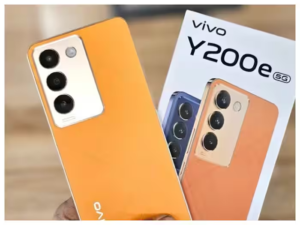AI-Powered Smartphones: Do They Really Enhance Your User Experience?

Artificial intelligence (AI) is rapidly transforming the smartphone industry. With advancements in processing power and machine learning, AI has become an integral part of most modern smartphones, offering enhanced performance, improved photography, battery optimization, and more. But do these AI features truly make a difference in daily use?
Let’s break down how AI-powered smartphones from top brands like Apple, Samsung, Google, and others are reshaping user experiences.
Key AI-Powered Smartphones Leading the Market
Before diving into specific features, it’s important to recognize the flagship AI-driven smartphones:
- Apple iPhone 15 Pro
- Samsung Galaxy S23 Ultra
- Google Pixel 8 Pro
- OnePlus 11
- Xiaomi Mi 13 Pro
These models are equipped with dedicated AI chips or integrated neural engines that make their AI capabilities faster and more efficient. But what exactly are these capabilities?
AI-Enhanced Cameras: A Game Changer?
Smartphones like the Google Pixel 8 Pro and iPhone 15 Pro have some of the most advanced AI-powered cameras in the market. These AI features have revolutionized mobile photography, making it accessible to both professional photographers and casual users.
Google Pixel 8 Pro takes the lead with its AI-powered Real Tone technology. This ensures accurate skin tones, and the Super Res Zoom feature, driven by AI, lets you capture incredible detail, even at extreme zoom levels. The AI recognizes the scene and adjusts color, brightness, and contrast to deliver stunning shots.
Similarly, Apple’s iPhone 15 Pro comes equipped with Smart HDR 5 and Deep Fusion, both of which use AI to analyze and improve image quality in real-time. AI identifies the scene and applies the perfect balance of exposure, shadows, and highlights, making your photos more dynamic without manual adjustments.
Even Samsung Galaxy S23 Ultra, known for its powerful 200MP AI-driven camera, excels at automatically enhancing photos in low-light conditions. Its Nightography mode, combined with AI, reduces noise and sharpens images when shooting in the dark, producing images that look more natural.
Do these AI camera features really enhance your experience? Absolutely. Whether you’re a photography enthusiast or someone who just wants a great shot without fiddling with settings, AI helps you capture high-quality photos in any situation.
AI for Battery Optimization: Lasting Longer with Smart Usage
One of the most practical ways AI improves smartphone performance is through battery management. AI-powered adaptive batteries, such as those in the OnePlus 11 and Samsung Galaxy S23 Ultra, analyze your usage patterns over time and allocate power accordingly.
For example, if you rarely use certain apps in the morning but frequently open social media in the evening, AI will optimize your phone’s battery to prioritize the apps you use most often. Xiaomi Mi 13 Pro’s AI-driven power management takes it a step further by putting unused apps to sleep, conserving energy and ensuring your phone lasts longer.
In real-world use, users report noticeable improvements in battery life. Phones like the OnePlus 11 use AI-based charging, which intelligently slows down charging at night, only ramping up power before you wake, extending battery longevity.
AI Voice Assistants: More Than Just a Helper
AI is also the driving force behind voice assistants like Google Assistant and Siri on iPhone. Google Pixel 8 Pro takes the lead here, integrating Google’s AI language model, which understands complex, multi-step commands better than ever before. Whether it’s setting reminders, controlling smart home devices, or performing web searches, the AI in Google Assistant learns and adapts based on your habits and voice patterns.
For iPhone 15 Pro users, Siri’s AI integration has become more sophisticated with iOS updates. Siri can now suggest actions based on your location, calendar, or even past interactions. For instance, if you routinely check the weather in the morning, Siri might preemptively offer that information.
AI Security: Facial Recognition and Beyond
AI-powered security features have made smartphones more secure than ever. For instance, Apple’s Face ID in the iPhone 15 Pro uses AI to constantly improve facial recognition accuracy, even as your appearance changes (e.g., if you grow a beard or wear glasses). The AI learns these subtle shifts over time, ensuring seamless and secure device unlocking.
Samsung Galaxy S23 Ultra offers AI-enhanced biometric recognition, including AI-based fingerprint sensors and 3D face scanning. These AI features make it more challenging for unauthorized users to break into your phone, providing top-tier security.
AI for Personalization: A Tailored Experience
Smartphones like the Google Pixel 8 Pro and Xiaomi Mi 13 Pro excel at personalizing the user experience. Pixel’s AI-driven interface learns from your habits—whether it’s suggesting the best apps at a particular time of day or managing notifications based on your activity.
Similarly, MIUI’s AI integration in the Xiaomi Mi 13 Pro adjusts everything from the user interface layout to notifications, based on how you interact with your phone. This can significantly reduce screen clutter and provide quicker access to the apps and information you use most.
AI for Gaming: A New Frontier in Mobile Entertainment
For gaming enthusiasts, AI-driven performance enhancements in smartphones like the OnePlus 11 and ASUS ROG Phone 7 make a huge difference. AI ensures smoother gameplay by optimizing GPU and CPU performance in real-time, ensuring fewer lags and a more responsive experience.
OnePlus 11’s AI-powered HyperBoost technology dynamically adjusts CPU performance to keep games running smoothly while maintaining a balance between performance and battery usage.
Do AI-Powered Smartphones Really Make a Difference?
The short answer: Yes.
The advancements brought by AI in smartphones have significantly enhanced user experiences across the board. Whether you’re a photography buff looking to capture the perfect shot with your Google Pixel 8 Pro, a gamer wanting optimized performance with the ASUS ROG Phone 7, or someone who needs longer battery life from your Samsung Galaxy S23 Ultra, AI is at the core of making your smartphone more intuitive, efficient, and enjoyable.
FAQs
Q1: Which smartphone has the best AI camera?
The Google Pixel 8 Pro stands out with its advanced AI camera features like Real Tone and Super Res Zoom, which make it exceptional for photography enthusiasts.
Q2: Can AI improve my battery life?
Yes, models like the OnePlus 11 and Samsung Galaxy S23 Ultra use AI-driven battery optimization to allocate power intelligently, extending battery life based on your usage patterns.
Q3: Do AI features increase the price of smartphones?
AI features are typically found in both flagship and mid-range devices, such as the Xiaomi Mi 13 Pro. While these features are more common in high-end models, they are becoming increasingly accessible in budget smartphones as well.
Q4: What’s the best AI-powered voice assistant?
Google Assistant on the Google Pixel 8 Pro is currently one of the best, thanks to its AI-driven language processing and ability to understand complex commands.
Q5: Are AI security features reliable?
Yes, AI-powered features like Face ID on the iPhone 15 Pro and Samsung’s AI-enhanced biometric recognition offer robust security by learning and adapting to your biometric data over time.
Conclusion
AI-powered smartphones are undeniably revolutionizing the way we interact with our devices. From enhancing photography and optimizing battery life to offering personalized experiences and improving security, AI is reshaping the smartphone landscape. Stay connected with Trend10 to keep up with the latest updates and reviews on AI-powered smartphones and discover how these advancements can improve your day-to-day life!




